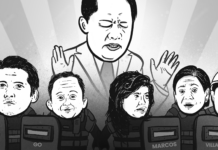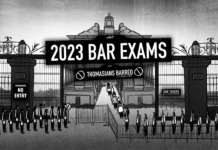DEBATES should be a platform for formal and intelligent exchange, especially at the University level. But in the recent “mandatory debate” for the Central Student Council (CSC) elections, candidates made vacuous remarks and unintelligible statements that put the University’s intellectual reputation to shame.
Perhaps the vacuousnes of the whole exercise started with the Comelec itself that called it a “mandatory debate”? Why should the debate be mandated at all? The election should afford an exchange of ideas between the candidates themselves and between them and the electorate, so why should the Comelec “authorize” or “mandate” them to debate? Couldn’t they have debated without “authorization”?
Anyway, rather than using the platform for rational discussions on issues that actually concerned the University, the candidates couldn’t seem to resist making rehearsed speeches and beauty contest-like answers, abandoning substance and intelligence in the process.
Although the election results were far different from the dominance of “abstain” votes of last year’s, most of this year’s candidates seemed to learn nothing from the flak the candidates last year reaped from students, faculty and alumni, who complained majority of the candidates lacked at least the minimum knowledge of social issues and current events.
Debating issues on tuition increase, on-campus protests and the passing of the Students’ Code, the candidates were glaringly inconsistent with their stands. Their claims were ambiguous that even media had a hard time interpreting their positions.
For instance, presidential bets Francis Santos and Karizza Kamille Cruz, who were running as independents, could not clearly explain why they backed the divorce bill.
Cruz brought up the importance of safety, especially in abusive marriages. However, she said Thomasians should uphold the “sanctity of marriage” because they were in a Catholic University—an argument that canceled or at least contradicted her earlier premise. Likewise, Santos highlighted that families should be protected, unless they were “not working.” What was he saying?
Sole vice-presidential bet Victor Amores Jr. said it was important to make a stand on social issues. However, when questioned on his stand on national issues such as the jeepney phaseout, he said he was “too focused” on his studies and his work at the Faculty of Pharmacy Student Council that he had no time to engage with, or at least be knowledgeable of, current issues.
Part of the problem was that the candidates were not made to debate in English. Allowed to use Filipino, they did not really speak Filipino but a chaotic pidgin (or is it patois?) of Filipino and English, or what used to be called “Taglish.” UST students are much like most students in Metro Manila who are unable to speak fluently in English or in Filipino, much less write in passable English or Filipino (precisely why law graduates from the provinces, especially the Visayas, have been topping the bar exams, which are in English, for some years now). Because they almost always lapsed back to creole speech, the candidates weren’t really able to articulate their thoughts, much less articulate them logically. It is here why the Comelec, which made the debate “mandatory,” should be held culpable for poor organization and management of the debate. If the debate were in Singapore, for example, the candidates would be “authorized” or “mandated” to speak in English; those who would speak in “Singlish,” as the English-based patois of the Straits island-state is known, would be penalized or even eliminated.
“Marami tayong data na magpapakita na maraming babae na nagkakaroon ng unhealthy relationships to the point na nawawala na yung sanctity of marriage,” Santos said in the debate on their stands on divorce. “Para sa akin mahalgang protektahan ang pamilya, pero ano pang po-protektahan natin kung wala naman na talagang nagwo-work? So para sa akin, I’m for divorce.”
His opponent just echoed his vague statement.
“I am in favor of divorce. Una sa lahat, dapat natin balansehin ang paniniwala natin bilang andito tayo sa Catholic university,” Cruz said. Does that make sense?
Some candidates tried to tackle social issues, such as the privatization of state hospitals, but lost the audience when they went into technical details in which they tried obviously to show their mastery of the subject matter. But that’s all right, since they attempted to provide intelligent discussion. But in the case of the three candidates for public relations officers, they were clearly overkilling it when they went into such topics as communist insurgency and constitutional reforms, topics that would otherwise be remotely in the list of duties and obligations of the public office they were running for. But at least they tried intelligent discussion, despite their incomprehensible patois.
A complete set of student council officers was declared after 26,148 out of a population of 37,658 students, or 69.44 percent, participated in the student elections. But these figures hardly indicate the triumph of democracy on campus. The Comelec had earlier ruled out abstentions to avoid last year’s disastrous results. This was said to be to obey the Central Judiciary Board that excluded “abstain” from the ballot.
How such a board could disqualify abstention which is the right of any voter anywhere and in any situation should indicate how the student governance and suffrage in UST are a matter of “mandatory” and authoritarian arrogance and not of democratic grace.
But as the lamebrained CSC debate should show, the elections are the triumph not so much of democracy, but of vacuity and unintelligibility.















